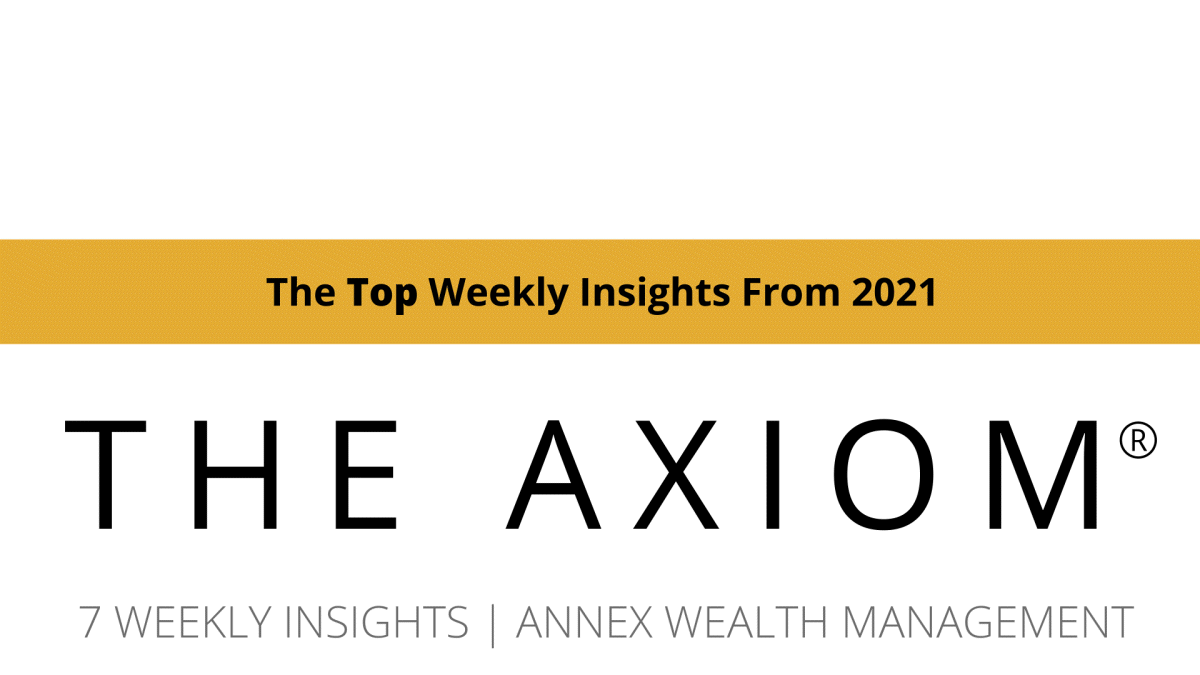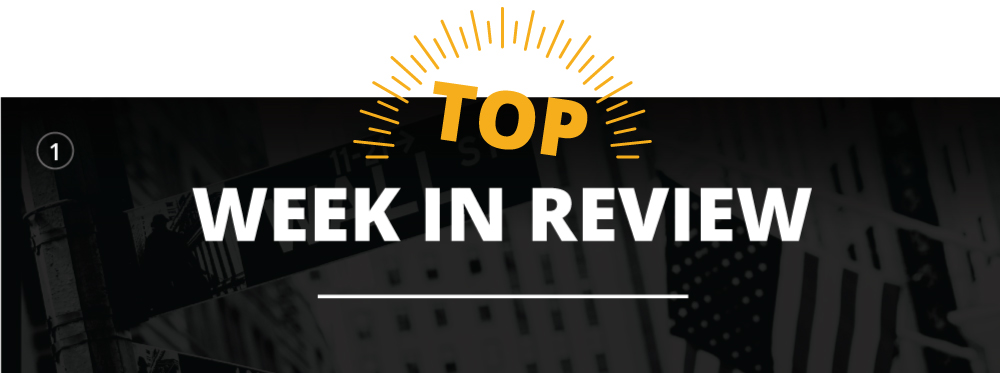
In this special Axiom, we revisit some of your favorite insights from 2021. Happy New Year!

In 2021, nearly all of the most-clicked Week In Reviews featured this hot topic: inflation. Although labeled ‘transitory’ for months, inflation is still hot. What’s the future of inflation? Annex Wealth Management’s Derek Felske provides some insight.
Inflation is the most significant economic concern going into 2022. Many are worried about a period of escalating prices, and don’t trust what they’re hearing from mainstream economists and central bank officials. At the start of 2021, the U.S. was forecast to end the year with 2% inflation, but it is close to 7% instead. The Fed is now in a difficult position. Fed Chair Jay Powell has backtracked on his “transitory” thesis, and accelerated the reduction in asset purchases. It is important to note that tapering is not tightening. We do expect the Fed to begin hiking the Fed Funds rate as soon as March but do not subscribe to the view that the Fed will raise rates aggressively.
The biggest risk is that inflation expectations may continue to rise and get imbedded in consumer psychology. The sharp increase in inflation has been a symptom of easy money policies, but more importantly, due to supply bottlenecks and increased consumer spending. If those factors were to ease, and inflation moderates. much of those fears could dissipate. The Fed could also pull off a delicate balancing act, where both growth and inflation decelerate, but not so much that the economic expansion is put in jeopardy.
We do expect volatility in the bond and equity market to be higher in 2022 than 2021. In fact, December was the most volatile month all year. The Fed’s presence in the fixed income market has dampened volatility. With their support waning, volatility in bonds will impact equity volatility, providing opportunities to alter portfolios on an opportunistic basis.
If history is any guide, the Fed’s “taper tantrum” of 2013 was followed by strong gains for equities, as traders bet the economy was healthy enough to stand on its own. Following Ben Bernanke’s comments in May 2013, stocks fell 5.8% in the next month, but for the rest of that year, the market was up 17.5%. Raising rates in 2022 could also be a “net positive” event by signaling that the central bank feels comfortable about the U.S. recovery.
The Fed will end its QE in March and currently expect to hike rates three times by the end of 2022. Policymakers forecast inflation to run at 2.6% next year, an increase from their 2.2% projection made in September, but to fall to 2.3% in 2023 and 2.1% in 2024. Its median projection was for rates to rise to 0.9% by the end of 2022, 1.6% in 2023 and 2.1% in 2024. Markets are betting that terminal rates, or where base rates will peak, will be lower than in previous cycles.
As always our investment committee will monitor economic, market and geopolitical conditions and make proactive changes where appropriate. We are honored by the trust you have placed in us. We send best wishes to all our readers for a great wrap-up to the holiday season and happiness and good health in the New Year. Happy New Year!
– Derek V.W. Felske, CFA® | Chief Investment Officer
BACK TO TOP ↑

When it came to the Axiom’s weekly poll, the most popular question we asked was about our changed perceptions about saving and being wealthy post-pandemic. “Which number best describes what you think it takes to be wealthy?” had the biggest response of 2021, and many of you came back to find out the results of the poll.
TOP POLL: Week 3: Which number best describes what you think it takes to be wealthy?
There’s no question current inflation had an impact on responses – as most respondents believe you must hit the $3,000,000+ mark to truly be considered wealthy. The second-place response was $2,000,000.
According to an annual wealth survey by Charles Schwab, Americans surveyed pre-pandemic claimed it took $2.6 million to be wealthy. Post-pandemic, that number dropped 23%.*
*https://fortune.com/2020/07/27/how-much-money-does-it-take-to-be-wealthy-definition-net-worth-finances-comfortable-coronavirus-pandemic-covid-19/
BACK TO TOP ↑

Every week, we bring you a MoneyDo – something you can focus on to improve your personal wealth picture. Your favorite MoneyDo in 2021 was actually a list of MoneyDon’ts: a list of things to avoid as you seek to get your planning on track.
TOP MONEYDO: Avoid These Estate Planning Mistakes
Innocent blunders can have a big impact on your best estate planning intentions. This week’s MoneyDo is actually a list of MoneyDon’ts: a list of things to avoid as you seek to get your planning on track.
Not Having an Estate Plan. Consider this: death and taxes are two of the few absolutes in life. Having an estate plan makes sure you effectively plan for both. Effective estate planning also acknowledges who can act on your behalf even in circumstances where you’re still living, but unable to manage your affairs.
Using Do-It-Yourself Software. Yes, lawyers can be expensive, but the cost is minimal compared to the expense of family fights, litigation, or legal costs your heirs could spend fixing a bad estate plan concocted by a bot.
Relying on Your Neighbor’s “Legal” Advice. No two estate plans are alike. Your neighbor may have all sorts of information about what they did for estate planning, but their financial situation is likely very different from yours. Avoid any estate planning steps without first discussing your personal situation with an attorney to determine your best course of action.
Creating Legally Invalid Documents. An estate plan is comprised of multiple documents, each with different requirements for witnesses or notaries. Often, especially with do-it-yourself estate plans, the documents were not properly executed and therefore are not legally valid.
Naming the Wrong Individual as Power of Attorney, Executor, or Trustee. You’d think that selecting who’s responsible for your financial affairs as you decline and after you die would be one of the biggest reasons to actually create an estate plan. But sometimes, this key detail doesn’t get the consideration it deserves. The individuals you name should be trustworthy, financially responsible, and good communicators who can let all beneficiaries know what is going on throughout the process.
Failing to do the Follow-Up Work. After you sign your estate plan documents, you’ll still have some work to do. Your attorney likely gave you instructions for updating beneficiary designations or changing how an account is registered. If you don’t complete this, the estate plan will not work as intended.
Failing to Review and Update Your Estate Plan. Estate plan documents are valid until they’re revoked or superseded by new documents. Your Will from 30 years ago is still legal, so if you have new plans for your assets or new family members, you need to update your estate plan. Estate tax and income tax laws have changed dramatically in the last 20 years, so any plan done before 2005 likely needs to be reviewed and updated to bring it current with the laws in place today.
Storing Plan Documents in an Inaccessible or Unreliable Location. A safe deposit box works, but only if someone other than you can get access to it. Other location ideas include personal lock boxes or a home safe, but again, make sure someone else has the key or combination. It’s also a good idea to provide copies to family as an additional backup.
Misunderstanding Your Estate Plan. Often, we’ll work with people who forget or never had a good understanding of how their estate plan works. Ask questions, take notes about your plan. Don’t forget that your attorney is a source of extensive information about the ins and outs of your estate plan.
Not Communicating Your Estate Plan. Circumstances will eventually require that you’ll likely hand off your day-to-day finances to someone else. Communicating the details of your finances and your estate plan will help ensure the transition is smooth. It’s a gift you can give your power of attorney, executor, or trustee: a simple process which avoids mundane tasks like hunting through decades of files to find out where your bank account is held.
BACK TO TOP ↑

2021’s most popular Ask Annex question was submitted by Susan – who had questions about gifting money to her son.
TOP ASK ANNEX: “I would like to gift my son $60,000 to buy a house. I have over $100,000 in my checking and saving accounts. What is the best way to do this?”
We asked Annex Wealth Management’s Eric Strom, CFP®:
Thanks for contacting us. Congratulations on being able to consider helping your son out. You’re wise to ask about the best way to gift funds to your son. Part of the answer involves understanding the gift tax rules, so let’s start there.
The tax code allows each individual tax payer to gift up to $15,000 per recipient per year without filing a gift tax return. Therefore, if you’re married, you may give $15,000 to your son in 2021 and your spouse can also gift $15,000 for a total of $30,000. This is called the annual gift tax exclusion.
Now, fear not. If your gift exceeds $30,000 then, yes, a gift tax return should be filed. However, this doesn’t mean gift tax is due. In addition to the annual exclusion, the tax code provides a lifetime gift and estate tax exemption of $11.7 million per person. This means a married couple can gift up to $23.4 million during their lifetime in addition to the annual exclusion. Filing a gift tax return simply reports the amount given over the annual exclusion so the IRS can apply the gift to your lifetime exclusion. What this means in simple terms is yes, you can give $60,000 to your son and likely not owe any gift tax. You will just need to report the gift through the gift tax return. To avoid the additional paperwork, perhaps you can gift $30,000 this year and another $30,000 in January?
We hope this helps.
Have a question for Annex? Submit it here!
BACK TO TOP ↑

“Does Your Advisor Do This?” emphasizes how Annex Wealth Management is different from other financial professionals. The most popular DYADT click in 2021 was about the 4% rule – which has recently come under fire from retirement experts who claim that this rate of withdrawal is no longer realistic.
BACK TO TOP ↑


Your favorite three radio clips in 2020 included Know The Difference Minutes: “Better Economic Data”, and “The Top 3 Most Dependable Car Brands”, as well as an Annex radio segment: “Ramifications Of Inheriting Money” – where Annex Wealth Management’s Estate Planning Attorney, Jill Martin, JD covered key aspects of inheriting money – the tax ramifications, the need to be patient, and why you may need to adjust your expectations.
KNOW THE DIFFERENCE MINUTE:
KNOW THE DIFFERENCE MINUTE:
ANNEX RADIO
BACK TO TOP ↑